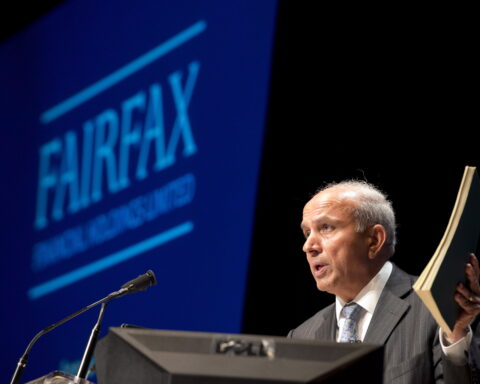The right of pension administrators in the United States to consider environmental, social and governance (ESG) factors in their investment decisions could be thrown into jeopardy by the same Trump-appointed judge who ordered a hold on the abortion drug mifepristone last week.
United States District Judge Matthew Kacsmaryk confirmed that he will hear a challenge to a federal rule approved last year enshrining the right of pension administrators to consider ESG issues. Twenty-five Republican states; an oil drilling company; and the Western Energy Alliance, an oil and gas association in the western U.S., are challenging the rule in Kacsmaryk’s jurisdiction, where he is the only district court judge.
Even though President Joe Biden recently vetoed Republican-led legislation banning the consideration of ESG factors by pension administrators, the court challenge is likely to succeed given Kacsmaryk’s conservative legal background.
“It’s no coincidence that Judge Kacsmaryk has on his docket a higher concentration of hot-button divisive social policy cases than any other judge in the country – people are seeking him out,” said Stephen Vladeck, a professor of constitutional law at the University of Texas at Austin, in an interview with The Guardian.
The case is expected to be heard in Kacsmaryk’s court in coming months. If he rules in favour of the challenge, it will go to the Fifth Circuit Court of Appeals, a conservative-oriented court in which 12 of the 16 active judges were appointed by Republicans. If the appeals court rules in favour of the challenge, it will move to the Supreme Court, which is also dominated by Republican appointees.
“Part of what makes Kacsmaryk especially attractive to conservative litigants is not just his actions as a trial judge, but also that his cases will end up in the Fifth Circuit, which is by far the most conservative in the country,” Vladeck said.
In the U.S., pension administrators are responsible for managing US$12 trillion in retirement savings for more than 150 million workers under private and public employer-based retirement plans. Over the years, they have come to understand that their duty as fiduciaries requires them to incorporate all risk-and-return drivers, including ESG factors, in making decisions on the investment of these assets.
A Trump-era rule changed this traditional understanding, drawing a distinction between “pecuniary” and “non-pecuniary” issues, and prohibited managers from considering “non-pecuniary” issues. The new Biden administration rule scrapped the pecuniary/non-pecuniary distinction. It specifically allows – but does not require – fiduciaries to consider “the economic effects of climate change” and other ESG factors when making investment decisions, so long as the considerations are rooted in a risk-return analysis.
Pensions could face “legal quagmire”
It’s not clear whether the Biden administration would be able to continue with its permissive ESG regulation if the courts rule against it. But just as Kacsmaryk’s ruling last week on the abortion drug has caused confusion about the legality of a drug that has been on the market for more than two decades, a decision against the ESG rule could also sow confusion among pension trustees and managers about their right to consider ESG factors.
Losing the right to include ESG factors in their assessments of risk and return would put trustees and managers in a “legal quagmire,” say a group of scholars writing for the Harvard Law School Forum on Corporate Governance. In an example of how traditionally non-pecuniary issues can come to be seen as financially material, the authors point to executive compensation, once seen as a moral issue of management overpayment but now fundamentally linked to company financial performance and corporate governance.
In the last year, ESG has come under attack by many Republicans who have accused the industry of practising “woke capitalism.” There is no evidence for this claim, which has been widely debunked by the investment industry.
“The Republicans would like us to believe that some bizarre viral epidemic of wokeism has spread into America’s great financial companies, into the investment advisors, into the banks, into all kinds of fiduciaries, and that needs to be somehow excised,” said Senator Sheldon Whitehouse, Democrat of Rhode Island, during a legislative session. “That is not what has happened.”
It’s no coincidence that Judge Kacsmaryk has on his docket a higher concentration of hot-button divisive social policy cases than any other judge in the country.
-Stephen Vladeck, a professor at the University of Texas at Austin
Nevertheless, the financial industry is alarmed by the Republican attacks against it. Responding to new state rules, the US$173-billion Texas Teacher Retirement System confirmed it no longer does business with any money managers identified by the state for supposedly “boycotting” the oil and gas industry. As well, 11 major banks and money managers told Bloomberg recently that they are quietly avoiding use of the term “ESG” in their communications and marketing materials in red states for fear of antagonizing Republican lawmakers.
This chilling effect comes at an important time, when pension fiduciaries are needed to assess investment risks and opportunities posed by a rapidly growing fossil fuel industry. Fossil fuel assets hold a strong risk of becoming stranded as renewable energy becomes more competitive against oil and gas, and climate policy changes like carbon pricing, vehicle emission standards and industrial CO2 and methane caps require a fossil fuel phaseout.
These risks are increasing. The New York Times recently reported that the fossil fuel industry is surging, driven by higher oil and gas prices caused by the Ukraine war. Oil and gas projects approved or about to be approved in 2023 will bring the equivalent of tens of billions of barrels of oil to the market. This includes the US$8 billion Willow oil project on Alaska’s North Slope, which was approved last month, as well as major projects in Qatar, Saudi Arabia, Russia and smaller producing countries like Canada.
The Net Zero Asset Owner Alliance (NZAOA), part of the United Nations Glasgow Financial Alliance for Net Zero, recently published guidance for its insurance and pension fund signatories, saying there should be no new investments in oil and gas fields, infrastructure or unabated gas-fired power stations. NZAOA said such projects are not consistent with its members’ climate change target, which is to limit global warming to no more than 1.5°C.
Eugene Ellmen is a former executive director of the Canadian Social Investment Organization (now Responsible Investment Association). He writes on sustainable business and finance.







